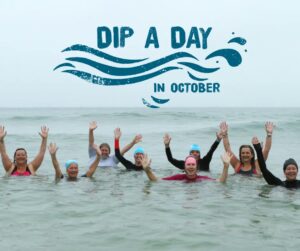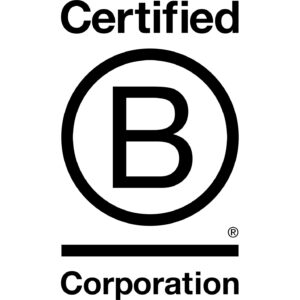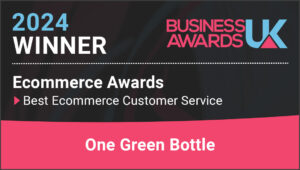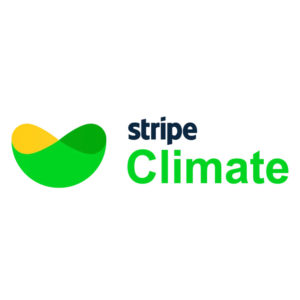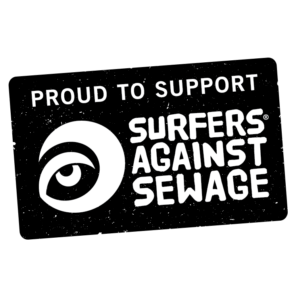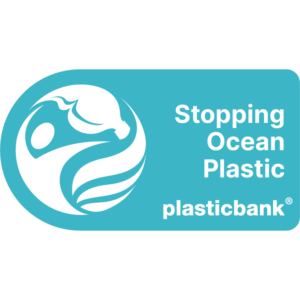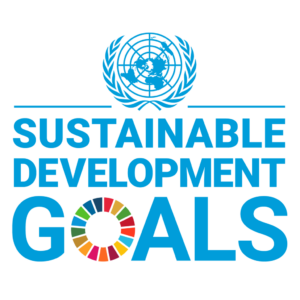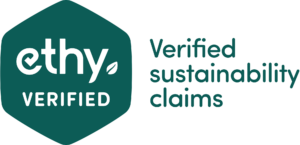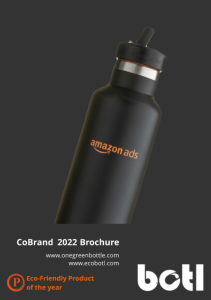Our seas and rivers have never been in a worse state after years of neglect by the water companies. Now, we routinely check the sewage app alongside the weather. Meet the new CEO of Surfers Against Sewage who plans to turn the tide.
One of those locals is Giles Bristow, a member of the Lyme Regis RNLI (Royal National Lifeboats Institution) crew and avid open-water swimmer, who says, “Our river has been declared ecologically dead because of sewage – how can that be? It’s tragic.”
Bristow is also the new chief executive of Surfers Against Sewage (SAS), the marine conservation charity famous for its gas mask-wearing members wielding surfboards as placards in protest about the state of our oceans and beaches. Now there’s a new face behind the gas mask.
He arrives for our meeting in London touting a folding bike, and my first impression is of a man of immense energy – so much so that I wonder for a moment if he’s cycled all the way from the south coast. He came by train, but maybe it was after a bracing early-morning session on a board, carving turns and doing tricks.
He laughs. “I have a huge love of the water,” he says. “I’ve always been in, on or under the water and I always carry my swimming gear with me. Am I also a surfer? Yes. Am I a good surfer? No, I’m enthusiastic. But Surfers Against Sewage is not just surfers and not just sewage.”

Right now, though, sewage is top of his list, because what’s happening with the river in Bristow’s home town is happening in rivers and on beaches all over the UK and, thanks to his new job, he is in a position to do something about it.
“Last weekend’s event was taking place in supposedly ‘excellent’ rated bathing water,” he says, “and yet it’s clear that a serious pollution incident has affected the water, making scores of competitors sick.” Bristow wants an urgent investigation.How have we arrived at a situation where we routinely check the sewage app alongside the weather app? He takes a beat before answering, like a man who still can’t quite believe the greed and stupidity of it all, even though he’s seen it for himself. “We could trace it back in part to privatisation of the water companies,” he begins. “That became an… ‘opportunity’ for the new owners to use them as a cash cow, to rack up debt. Across the industry they’ve taken on massive debt to be able to do some infrastructure investment but principally they’ve been paying dividends.”
English water privatisation began in 1989, and perhaps it’s merely a coincidence that it was only a year later, in 1990, that a bunch of Cornish surfers who cared deeply about not getting ill while enjoying their sport found their favourite beaches so filth-ridden that they were galvanised into forming Surfers Against Sewage. Perhaps.
Part of the problem is that over the intervening 34 years since privatisation it has become difficult to unravel who is responsible for what. Only 10% of English water is UK-owned; 72% is controlled overseas through complex and opaque ownership structures; and the final 18%? No one is quite sure who owns it.
What you can be sure about is that, if you live in England, on average, you pay 20% of your water bill to service debt raised to reward mostly overseas owners rather than maintain our crumbling water network. And a creaking water network means more pollution. Up to last year, these companies paid out £65.9bn to shareholders and owners. Most of that was funded through borrowing money so that, collectively, they are now £54bn in debt.
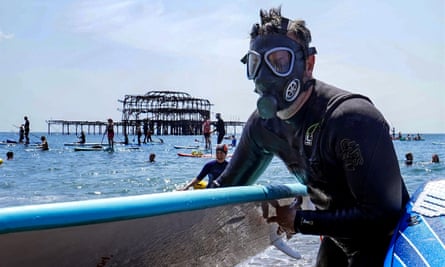
“What’s paid the price,” says Bristow, “is the environment, biodiversity, the state of our rivers and coastline. But also consumers – we have all paid for this. For a service that we were never getting properly and fully.
“None – not one – of our rivers has good chemical status after 30 years of this privatisation. And so am I angry? Yes, but so are friends and family and people I know who are very calm and very measured and not campaigners or activists in any way. They are really angry, they’re, like, how did this happen? And we’re paying for it, too! We’re not getting what we paid for.”
Bristow, 49, was born in Zaire while his father was there working as a banker. It was a job which saw the family move around Africa, and also inspired young Bristow with a love of nature. “Dad’s sense of adventure meant everywhere we went he was always, like, ‘Check this out’ – the natural world – and he instilled in me this sense of wonder and fascination for the world, but also a sense of sadness that in front of our eyes things were not good – and getting worse. I always saw the beauty in nature and thought, we can’t destroy it, we’ve got to look after it.”
He arrives at Surfers Against Sewage via an early career as an environmental lawyer in the City of London followed by years working for NGOs around the world, mainly in sustainable energy. “I knew I didn’t want to stay in the corporate world,” he says of his time as a lawyer. “It always gnawed away at me that I was not part of the greater climate solution.”
The corporate legal world feels at odds with Bristow’s ideas about protecting the environment. Is that why he ditched the City? No – and he doesn’t see the relationship between activism and money as an oppositional thing: “All these global problems are only going to be fixed by bringing all perspectives to the table and ensuring a just transition – and a just transition is for everybody, right? We can’t exclude big groups and we can’t change the world if we don’t understand the world of big business, of government, of regulation, of finance. Of all of us. It would be foolish to ignore those perspectives.”
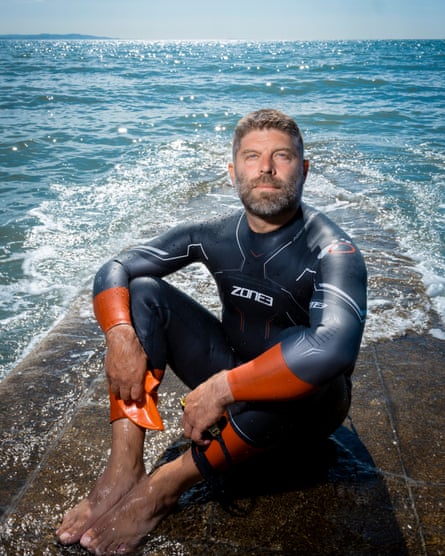
But after 30 years of these corporate entities using our water industry as a piggy bank, where does an organisation like SAS even start in tackling the issues? The morning of our interview, SAS relaunched their Safer Seas and Rivers Service app, “a tool for anyone wanting to take a dip without fear of dysentery”. Through the app you can report illness as a result of swimming, as well as notify your MP and water company with evidence of pollution. Bristow is excited about it – though the app has just told him he couldn’t swim at his local beach for the next couple of days due to discharges of sewage by South West Water.
He also points to specific local action, from organising volunteers to pick up plastic on beaches, to helping get those same beaches declared a bathing water designated site – which means more monitoring can be put in place to help keep them that way.
“But what really drew me to Surfers Against Sewage is that it links the beach front with the frontbench,” he says. “All of these local actions can be aggregated and taken to parliament where we can say, ‘This is what we all want, this is what’s going on out there. Ignore it at your peril and, by the way, we’ve done some thinking for you, we’ve got the science and data and policy ideas and this is how to make things better.’”
What does making things better look like?
“OK, so better regulation – that’s in the gift of the government. There is a structure but there is a combination of weak regulation, plus weak enforcement. There are amazing people at the environment agency but they are hamstrung by lack of resources, lack of ability to enforce, lack of ability to do the monitoring they want to.”
One big opportunity for change and improvement, he says, is through being smart about infrastructure renewal using modern, nature-based solutions that have co-benefits. “Sustainable urban drainage systems, or ‘soft’ engineering, creates a cleaner, cooler environment for us at the same time as being better for biodiversity. These systems provide ways to slow the rate of rainfall getting into the system, thereby reducing the pressure on it. They are cheaper and, if we factor in all the co-benefits, much more positive overall.
“So there’s a combination of hard engineering, soft engineering, practice, regulation, government control and, at the end of the day, the nature of the water companies and their cultural attitudes to these problems.”
But renationalisation is the big one, a potential solution that feels like it’s gathering momentum, especially in the light of Thames Water’s recent financial near-collapse.
“We’re open to all potential avenues, including nationalisation – and we are exploring the viability of that approach. But we’re an evidence- and science-based organisation, and we would want to be sure that this is the best way to return to thriving waterways and coastal areas. We’ve all been paying for investment in better infrastructure and a cleaner, more healthy environment, but the water companies have not delivered, and they’re now asking us to pay again! However we sort this mess out, it can’t be that consumers and communities have to pay again – we need innovative and fresh thinking to find a better way forward.”
Somewhere behind all of this though, mingled with the odour of all that sewage, I can’t help wondering, is there a whiff of that other great national pollutant, Brexit? “What we can say is that we weren’t on a massive pathway to improvement over the past 30 years anyway when we were part of the European Union. But the EU legislation is definitely a source for good in environmental terms – as environmentalists we felt we were part of a good project and on a road in the right direction. With that taken away and government attitudes to reducing regulation to allow Britain to ‘fly’ – of course that’s going to have some effect.”
But while sewage is hogging all the attention, we mustn’t let plastic off the hook. Plastic pollution, Bristow is keen to point out, is massively prevalent. Projections are that it will still get worse: England’s rivers have some of the highest levels of microplastic pollution in the world.
“We don’t yet know what that means for our health. It’s going into the ecosystem and food chain and we could be looking at a huge health timebomb. So plastic is a major issue – and it props up the fossil fuels industry. The climate effect of all this on our oceans is just phenomenal.”
The natural systems critical to keeping the world at a “beautiful, stable” temperature are being challenged. And it all comes back to ocean recovery and climate protection. A complex web of problems with a simple rallying cry: fix it and fix it soon because, like so many of us, Bristow loves being in the water but, also like so many of us, he has paid a price with ear and eye infections, stomach bugs and nausea. “I have seen raw sewage being discharged on our beaches, and found myself in slicks of toilet paper, plastic and sanitary products. To be super clear, this is not something you might witness once or twice but something you can find at any time around our beautiful coastline and anyone who goes near the water will tell you the same.”
He swims most days at dawn with a group of friends, “bound together by that cold, clear, beautiful water, and I have a vision that the health of that environment improves and access to it is open to everybody who wishes to use it free of fear for their health.
“The River Lym can be improved, we can bring it back to life. That is about political will, that is about business doing the right thing. It’s about communities getting behind that. In the areas of nature recovery, biodiversity, ocean plastics and climate, Surfers Against Sewage can bring something hugely unique because when you take part in a community like this you take part in a community of people who share a love of being in the water whether you’re surfing, kayaking or swimming – you have that sense that we love the water because of the way it makes us feel – that’s a point of connection. That’s about being human, that’s about saying there’s stuff here that’s more important than profit – a love for the ocean.”
This October Surfers Against Sewage are doing ‘A Dip A Day’ fundraising event. Sign up here top take part and support SAS in their pledge to make our waters safer.
